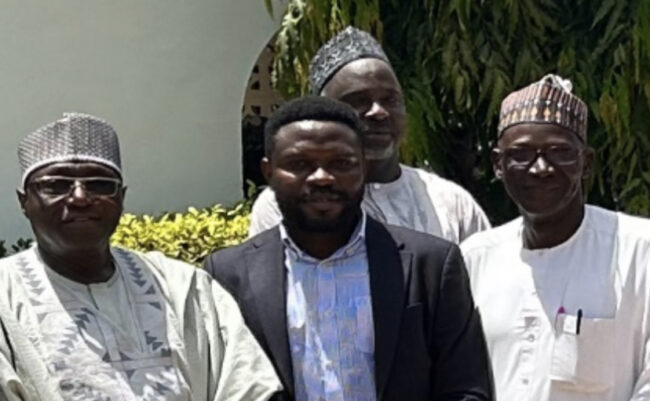In a landmark initiative to diversify agriculture and enhance food security, Kebbi State has collaborated with the Integrated Rice-Fish Farm Diversification Project (IRFDP) to scale up rice-fish farming. As part of the project review, Mr Oluwafemi Ajayi, the Project Coordinator from the Food and Agriculture Organisation (FAO), visited Kebbi State to meet with government officials and assess the progress and outcomes of this transformative initiative.
During the visit, Mr Ajayi highlighted the pivotal role of rice-fish farming in addressing food security challenges while improving farmers’ livelihoods. “This project exemplifies how agriculture can be reimagined to provide dual sources of income for farmers, increase productivity, and bolster food security. Kebbi State has shown great promise in leading this charge,” he stated.
Kebbi’s Commitment to Agricultural Innovation
Governor Nasir Idris, represented by the Secretary to the State Government, Bala Tafidan Yauri, expressed the administration’s strong commitment to the project. “Agriculture is at the heart of our development agenda, and we are fully behind this project. We aim to extend it to all 21 local councils in Kebbi to maximise its impact,” Yauri said during the courtesy meeting with the IRFDP team.
Mr Ajayi lauded the state government’s proactive approach. “The support from Kebbi State is commendable. Expanding rice-fish farming across the state will not only increase agricultural yields but also set a benchmark for other states to follow,” he remarked.
Empowering Farmers Through Technology and Training
The IRFDP, supported by FAO and in collaboration with Nigerian institutions such as the University of Ibadan, Usmanu Danfodiyo University, and the University of Georgia in the US, has provided farmers with the skills needed to adopt rice-fish farming. Capacity building through training and technology adoption has been central to the project’s success. Farmers have shown significant enthusiasm, integrating fish farming into their rice paddies to diversify their income streams and enhance resilience. In the project’s focus areas of Kebbi and Ebonyi States, farmers have received practical training on sustainable practices. The exchange of knowledge among farmers has been particularly effective, with peer-to-peer learning proving to be a powerful tool. Local farmers have also demonstrated great ingenuity in adapting techniques to suit their specific environments.
Scaling Up for Greater Impact
Reflecting on the project’s success, Mr Ajayi outlined the vision for expansion. “The pilot projects in Kebbi and Ebonyi have demonstrated the viability and benefits of rice-fish farming. Our next steps include scaling up these efforts nationwide, providing continuous support to farmers, and fostering collaboration across states,” he said. He also stressed the importance of farmer exchange visits: “Learning directly from successful practices accelerates adoption and builds confidence. The innovative approaches developed by farmers in one region, such as predator-proof fishponds in Ebonyi, can serve as models for others.”
He concluded his visit with optimism: “The partnership between Kebbi State and IRFDP is a shining example of what can be achieved when innovation meets commitment. With sustained government support and community involvement, rice-fish farming can revolutionise agriculture in Nigeria, ensuring food security and creating sustainable livelihoods for generations to come.”
The IRFDP continues to work closely with Kebbi State and other stakeholders to expand the reach of rice-fish farming, setting the stage for a more resilient and productive agricultural sector in Nigeria.
READ MORE FROM: NIGERIAN TRIBUNE






